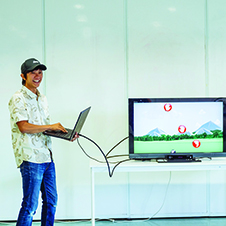![]()
Understand the science of human movement and performance
The list of benefits of exercise and sport participation on health, wellbeing, and quality of life is continually growing. Exercise and Sport Science is an internationally-recognised scientific discipline consisting of four core sub-disciplines:
- Biomechanics
- Motor control / learning development
- Physiology
- Psychology
Our curriculum is aligned with accrediting bodies in Exercise and Sport Science providing attractive career opportunities.
Study at the School of Physical Education, Sport and Exercise Sciences
The Exercise and Sport Science major is hosted at the School of Physical Education, Sport and Exercise Sciences.
We are the number 1 ranked department in New Zealand, and 12th in the world in our field.
Why study Exercise and Sport Science?
- Our curriculum is aligned with Sport and Exercise New Zealand and Exercise and Sport Science Australia. After completing our major you will be prepared to write the accreditation tests for these accrediting bodies.
- You can combine with other majors and minors across the School to provide multiple specialisations.
- We offer a practicum providing the opportunity to gain clinical, lab or field experience
Exercise and sport also provide essential vehicles for societal life-long learning and wellbeing. The academic study of exercise and sport science will remain an important pursuit for the foreseeable future.
Background required
There are no specific Year 12 or 13 level subjects required for admission. However, biology and physics are helpful.
Basic numeracy skills are also recommended.
Career opportunities
- Exercise physiologist
- Exercise prescription adviser
- Mental skills trainer
- Performance analyst
- Personal trainer
- Sport / health industry research and development
- Sport scientist
- Strength and conditioning trainer
- Technique analyst
What you will study
Bachelor of Science (BSc) majoring in Exercise and Sport Science
| Level | Papers | Points |
|---|---|---|
| 100-level | SPEX 101 Sport, Science and Society | 18 |
| SPEX 102 Principles of Exercise for Health and Performance | 18 | |
|
and either: ANAT 101 Anatomy for Sport and Exercise, and PHSL 101 Physiology for Sport and Exercise or HUBS 191 Human Body Systems 1, and HUBS 192 Human Body Systems 2 or PTWY 131 Introduction to the Human Body, and HUBS 192 Human Body Systems 2 Note: PTWY 131 is only available to students enrolled in the Diploma in Science. | 36 | |
| 200-level | SPEX 201 Biomechanics | 18 |
| SPEX 202 Motor Behaviour | 18 | |
| SPEX 203 Exercise Physiology | 18 | |
| SPEX 204 Psychology of Sport and Exercise | 18 | |
| 300-level | Four of: | 72 |
| Plus | 144 further points (SPEX 206 Te Pū o te Ora Māori Physical Education and Health recommended); must include 36 points at 200-level or above. | 144 |
| Total | 360 |
Postgraduate options
We have a strong postgraduate culture and you can undertake further studies in Exercise and Sport Science.
Find out more about postgraduate study in Exercise and Sport Science
Profile
 Jonathan Ng
Jonathan Ng
PhD Candidate
Jonathan Leo Ng is exploring the use of a low-cost motion-sensing technology to assess movement skills in a fun and engaging way.
Research has shown that children with better movement skills stay physically active for life. Monitoring children's movement competency is therefore an important scientific challenge.
Together with Associate Professor Chris Button (Dean of School of Physical Education, Sport and Exercise Sciences), Jonathan has customised a series of active video games that automatically tracks and assesses movement while children play.
Jonathan's research embraces the idea that there are many ways children can move to reach their goal. It is underpinned by a theory known as the ecological dynamics approach, which suggests that movements are the result of many interacting factors and should be unique to each individual.
Jonathan syays that one of the most enjoyable aspects of his research journey is the partnerships he has formed with various community groups:
“Research is made more meaningful when the results of your work may benefit communities. In my time here, I have forged friendships not just with fellow students but also with academic and support staff. You never feel alone here. The beauty of Dunedin; its landscape and people just brings the student experience to a complete next level!”.